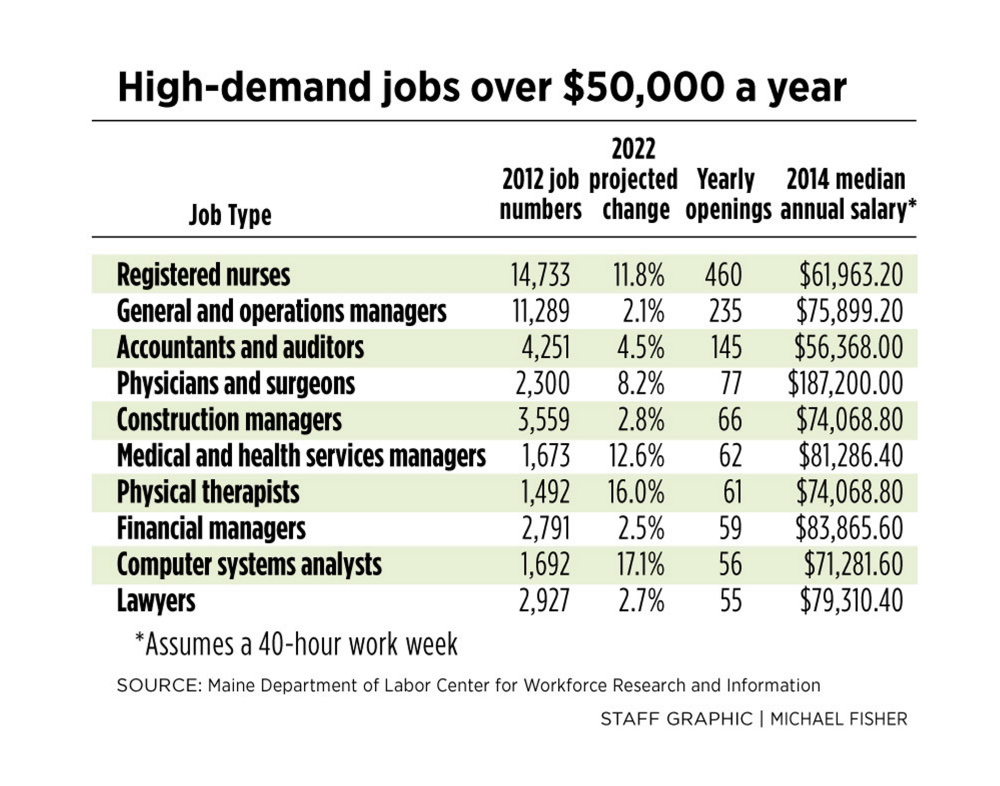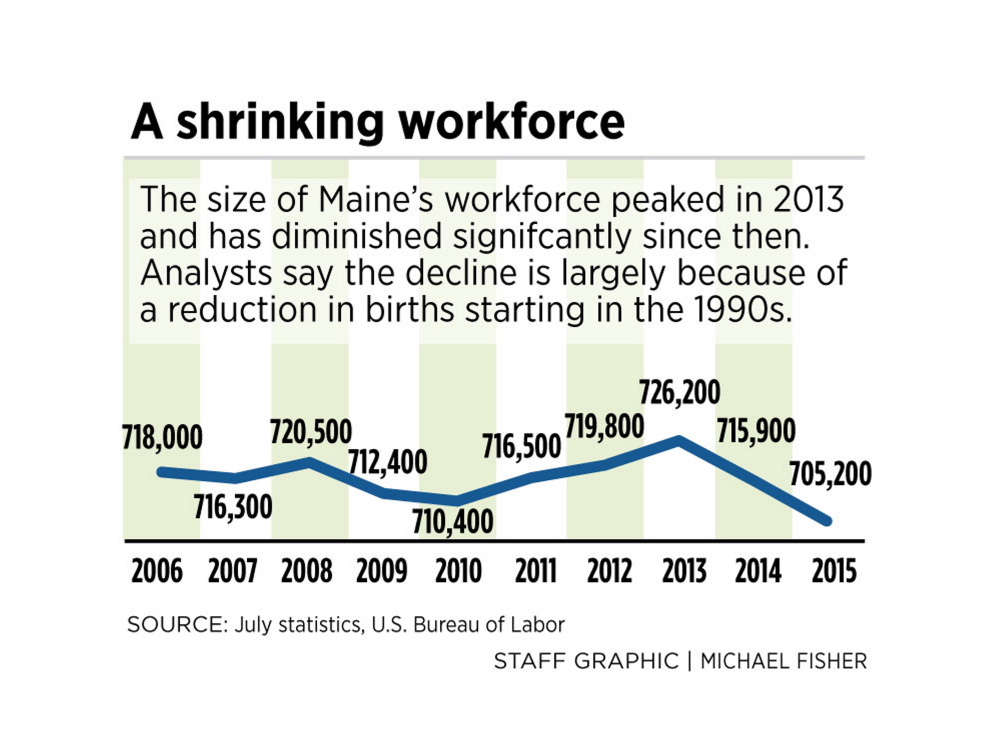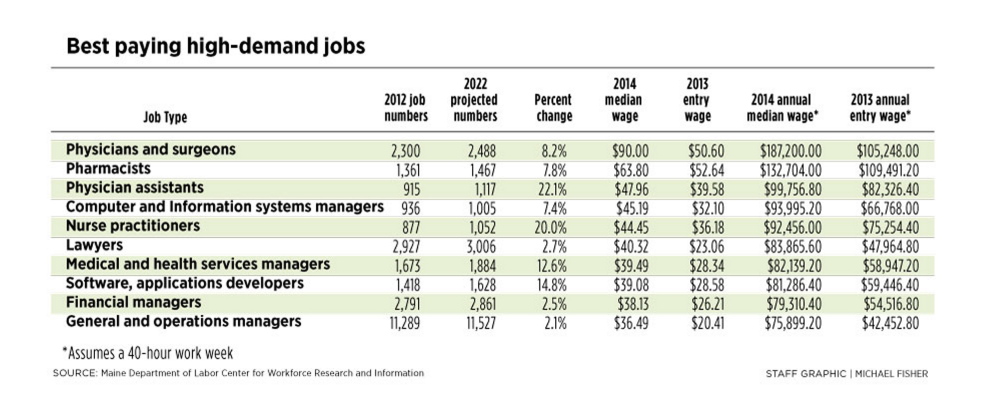Hey, young people. Do you want to stay in Maine and enjoy a high-paying, stable career? Here’s what you need to know.
There are dozens of professions in relatively high demand among employers in the state that pay a median wage of at least $50,000 a year for full-time work, according to the Maine Department of Labor’s Center for Workforce Research and Information. Most require specialized training, so proper education is a must. And most are located in or near a city.
Maine’s workforce is shrinking as older workers retire and younger ones leave the state to pursue other opportunities. According to the Muskie School of Public Service, by 2025, there will be two working-age Mainers for every person 65 or older. Employment specialists say those losses will leave open thousands of great opportunities for tomorrow’s workforce right here in Maine. They are hoping to change the common perception that the only jobs available in Maine are low-paying service jobs.
The workforce research center anticipates that roughly 15,200 jobs will need to be filled annually in Maine through 2022 to keep up with retirements, out-of-state moves and other forms of attrition. Another 2,600 new jobs will be created each year, it said, while others will disappear.
More than 100 different professions will be in demand, ranging in median annual pay from $33,925 (correctional officers and jailers) to $187,200 (physicians and surgeons), according to the center’s Maine Workforce Outlook 2012 to 2022 report. All annual pay figures assume a 40-hour work week.
AGING POPULATION MEANS MORE HEALTH CARE JOBS
Four of the five best-paying careers expected to see the highest growth in demand are in health care, the report says. They include medical doctors, pharmacists, physician assistants and nurse practitioners. Other in-demand jobs with salaries above $50,000 include general and operations managers, accountants and auditors, sales representatives, construction managers, physical therapists, financial managers and computer systems analysts, the report says.
The workers in greatest demand who earn a median salary of at least $50,000 a year are registered nurses, with more than 450 job openings expected each year.
“(Registered nurse) is one of the largest occupations in health care,” said Glenn Mills, chief economist at the Center for Workforce Research and Information. “It’s still a hands-on job, one on one, dealing with the patient.”
Mills, who co-wrote the workforce outlook report with economic research analyst Ruth Pease, said a growing health care workforce is needed for two reasons: Maine’s aging population and the advent of new medical tests and treatments.
The state’s aging population contributes to the need for health care workers in two ways. Demand for health care increases as the population ages, as does the need to replace existing workers who are retiring.
Health care has replaced manufacturing over the past 30 years as the state’s largest employment sector, according to the report. In 1982, there were roughly 109,000 manufacturing jobs in Maine, compared with 36,000 health care jobs, it says.
“Today the situation is nearly reversed. We have fewer than half as many manufacturing jobs (50,000) and health care is now the largest employing sector, with nearly three times as many jobs (101,000),” the report says.
SPECIALIZED SKILLS IN DEMAND
The shifting makeup of Maine’s workforce mirrors that of the nation.
An increasing share of available jobs that pay relatively well require highly specialized education, Mills said, as many of those that don’t require special training have been replaced by technology, leaving primarily “technical jobs that can’t be – or haven’t yet been – automated.”
Such jobs include doctors, nurses, lawyers, accountants, financial managers, software developers and computer systems analysts. About 60 percent of projected net job growth in Maine consists of occupations that require some form of postsecondary education, Mills said. The highest-paying jobs that do not necessarily require a highly specialized college education are sales representatives and various types of managers.
The Maine Development Foundation and Maine State Chamber of Commerce issued a report in November that recommends ways to bring into Maine’s workforce the estimated 65,000 workers needed to satisfy projected demands through 2020.
One recommendation is to develop educational programming that teaches students in the state which skills employers are looking for.
“There’s a bit of a void” when it comes to outreach programs targeting students with the goal of preparing them to enter Maine’s workforce with the skills most needed by employers, said Ryan Neale, program director at the Maine Development Foundation.
Part of the reason is that many teachers are averse to programs that attempt to steer students toward particular career fields, he said.
“Educators don’t want to push kids into certain jobs,” Neale said.
To some extent, students should remain true to their interests and aptitude, he said. Still, it would not hurt them to have more information about the types of professions that are likely to provide the best-paying and most stable careers if their goal is to live and work in Maine, Neale said.
The foundation estimates that in order to keep up with Maine’s workforce demands, about 26,000 job openings through 2020 will need to be filled by young adults – either existing Maine residents or those moving to Maine from out of state. That figure excludes foreign workers, which the foundation estimates will be needed to fill roughly 12,000 additional jobs. Others needed to bridge the employment gap include 10,000 people with disabilities, 12,000 older workers and 5,000 veterans.
One barrier to connecting the right candidates with higher-paying jobs is that in many cases, workers will need to relocate to where the jobs are, Mills said. That often means migrating from north to south, and from rural to urban areas, he said.
“The nature of growth jobs is to be in a city,” Mills said.
Copy the Story Link
Send questions/comments to the editors.






Success. Please wait for the page to reload. If the page does not reload within 5 seconds, please refresh the page.
Enter your email and password to access comments.
Hi, to comment on stories you must . This profile is in addition to your subscription and website login.
Already have a commenting profile? .
Invalid username/password.
Please check your email to confirm and complete your registration.
Only subscribers are eligible to post comments. Please subscribe or login first for digital access. Here’s why.
Use the form below to reset your password. When you've submitted your account email, we will send an email with a reset code.